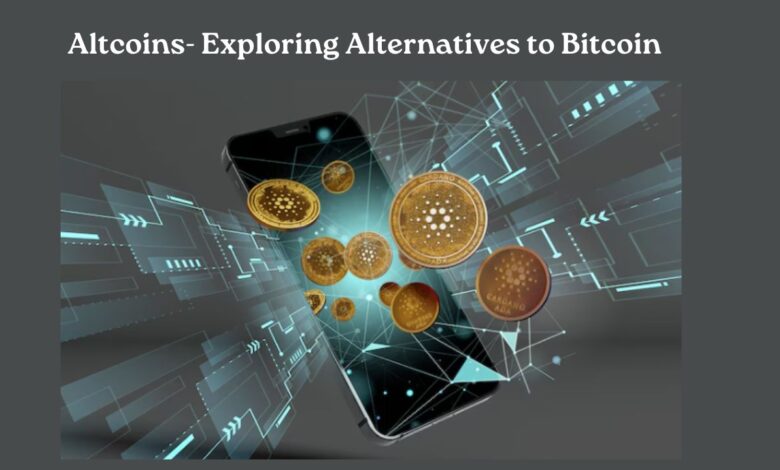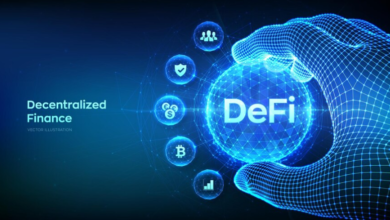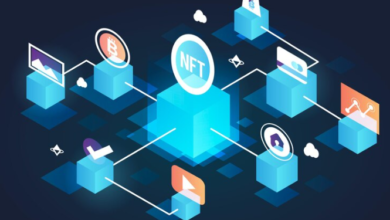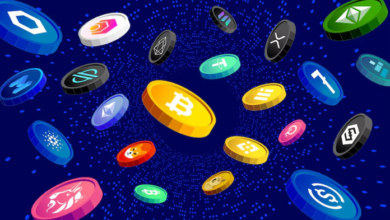Introduction to Altcoins: Exploring Alternatives to Bitcoin

Within the dynamic sphere of cryptocurrencies, Bitcoin stands out as the pioneering and best-known digital currency. However, since its inception in 2009, many alternative cryptocurrencies, or “altcoins,” have emerged, offering diverse features and use cases beyond what Bitcoin provides. These altcoins represent an exciting and rapidly expanding sector of the cryptocurrency market, each with its unique attributes and potential.
The Rise of Altcoins
Bitcoin, created by the pseudonymous Satoshi Nakamoto, pioneered decentralized digital currencies via the blockchain and proof of work (PoW) consensus mechanism. Initially designed for peer-to-peer electronic cash and as a store of value, Bitcoin’s rise prompted developers to address its limitations like scalability and speed, leading to the creation of altcoins.
What are Altcoins?
Altcoins are cryptocurrencies other than Bitcoin that expand the possibilities of blockchain technology. They cover a wide range of digital currencies with unique technologies, purposes, and features, diversifying the landscape of decentralized finance.
Altcoins can be categorized into several types based on their unique characteristics:
1. Forked Coins:
Some altcoins, like Bitcoin Cash (BCH) and Bitcoin SV (BSV), are created by forking the Bitcoin blockchain, retaining core principles but introducing distinct features.
2. Smart Contract Platforms:
Ethereum (ETH) pioneered programmable smart contracts, empowering developers to develop decentralized applications (DApps) and execute complex transactions autonomously.
3. Privacy Coins:
Through advanced cryptographic techniques, altcoins such as Monero (XMR) and Zcash (ZEC) prioritize user privacy and anonymity.
4. Stablecoins:
Unlike most cryptocurrencies, stablecoins are pegged to stable assets like fiat currencies (e.g., USD Coin, Tether) or commodities to reduce price volatility.
5. Utility Tokens:
Altcoins like Binance Coin (BNB) and Chainlink (LINK) are used within specific blockchain ecosystems to pay transaction fees or access network features.
Advantages and Disadvantages of Altcoins
Altcoins offer several advantages over Bitcoin, catering to diverse user needs and preferences:
1. Innovation:
Altcoins drive innovation within the blockchain space by introducing novel technologies and use cases.
2. Specialization:
Different altcoins specialize in specific areas, such as privacy, scalability, or interoperability, providing tailored solutions for users.
3. Diversification:
Altcoins enable portfolio diversification for cryptocurrency investors, reducing reliance on a single digital asset.
However, altcoins also come with certain drawbacks:
1. Volatility:
Many altcoins experience higher volatility than Bitcoin due to lower market liquidity and adoption.
2. Security Concerns:
Some altcoins may have less robust security features than Bitcoin, making them more susceptible to attacks.
3. Regulatory Risks:
Altcoins face regulatory uncertainty in various jurisdictions, potentially impacting their long-term viability.
Popular Altcoins Explained
1. Ethereum (ETH):
The second-largest cryptocurrency, Ethereum pioneered smart contracts and fueled a wide array of decentralized applications (DApps) and DeFi projects.
2. Ripple (XRP):
Designed for real-time cross-border payments, Ripple targets banks focusing on faster and cheaper international transactions.
3. Litecoin (LTC):
Often called “silver to Bitcoin’s gold,” Litecoin offers quicker confirmations and uses a different hashing algorithm (Scrypt) than Bitcoin.
4. Cardano (ADA):
Emphasizing scalability and interoperability, Cardano provides a secure platform for deploying decentralized applications.
5. Polkadot (DOT):
A multi-chain platform enabling interoperability between diverse blockchains, Polkadot facilitates secure information and transaction exchange.
Investing in Altcoins
Altcoins can be rewarding and risky due to their inherent volatility and market dynamics. Here are vital considerations for altcoin investors:
1. Research:
Conduct thorough research on the altcoin’s technology, team, use case, and market demand before investing.
2. Diversification:
Allocate investments across multiple altcoins to mitigate risk and exploit potential growth opportunities.
3. Risk Management:
Limit your investment to what you can afford to risk, considering the unpredictable movements in altcoin markets.
4. Security:
Store altcoins securely in reputable wallets and exchanges to protect against theft or loss.
The Future of Altcoins
Altcoins are evolving fast amid tech progress and rising demand for decentralized solutions. As blockchain matures, they’re poised to transform healthcare, supply chains, and governance. Yet, hurdles like regulations, scalability, and interoperability still need to be solved, slowing adoption. Collaboration between blockchain projects and regulators is critical for altcoin innovation and broader acceptance.
DeFi and Altcoins
Decentralized Finance (DeFi) showcases the transformative power of blockchain technology in traditional finance. Altcoins like Ethereum drive DeFi by enabling protocols such as decentralized exchanges (DEXs), lending platforms, and automated market makers (AMMs). DeFi leverages altcoins to create accessible and transparent financial instruments, revolutionizing global markets.
Interoperability and Altcoins
Many altcoins prioritize interoperability to facilitate seamless communication and value transfer across blockchain networks. Projects like Polkadot, Cosmos, and Avalanche lead cross-chain compatibility, addressing scalability challenges and unlocking decentralized application and asset management across multiple blockchains.
Environmental Impact:
Altcoins are shifting from proof of work (PoW) to consensus mechanisms like proof of stake (PoS) or delegated proof of stake (DPoS) to reduce energy consumption. These altcoins pursue environmentally friendly alternatives to PoW-based cryptocurrencies by embracing sustainable blockchain protocols.
Regulatory Diversities:
Altcoin regulations differ globally, ranging from support to strict controls or bans. Clear guidelines are vital for altcoin projects to comply with evolving laws. Collaboration between industry and policymakers is essential for fostering altcoin innovation and adoption.
Asset Tokenization:
Altcoins enable real-world asset tokenization (e.g., securities, commodities, real estate), fostering fractional ownership, liquidity, and asset accessibility. This tokenization, powered by altcoins, could revolutionize asset management, streamline transactions, and open up diverse global investment prospects.
Altcoin Trends:
1. NFTs:
Altcoins such as Ethereum are driving the surge in NFTs, facilitating the trading of unique digital assets like art, collectibles, and virtual real estate.
2. Layer 2 Scaling:
Altcoins are adopting layer two scaling solutions like Optimistic Rollups and zkRollups to boost transaction speed and lower fees, making blockchain networks more user-friendly for mainstream applications.
3. Governance Tokens:
Altcoins featuring governance tokens enable community-driven decision-making, giving token holders a voice in protocol governance, funding decisions, and upgrades.
Conclusion
Altcoins are transforming finance and technology by offering solutions like scalability improvements, DeFi innovations, and sustainability. As this ecosystem matures and gains mainstream acceptance, stakeholders must collaborate, innovate responsibly, and navigate regulations to maximize decentralized technologies’ global impact.
Visit www.intogeeks.com for more valuable insights about altcoins.




